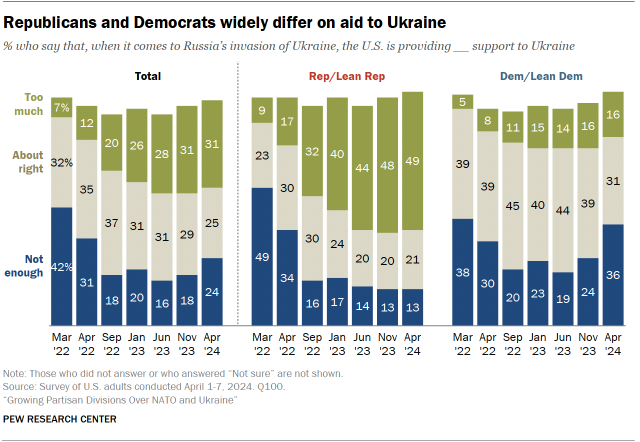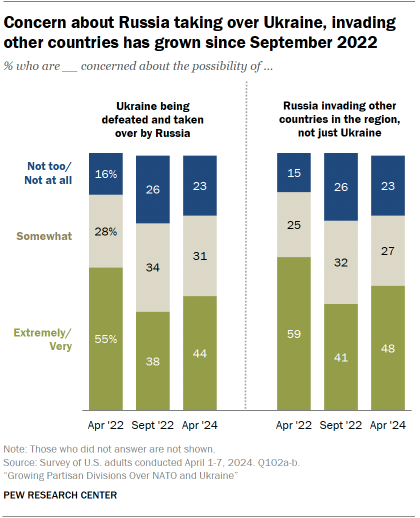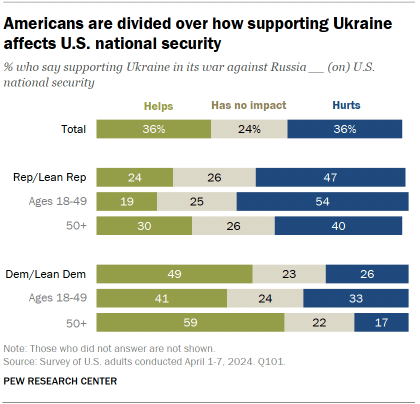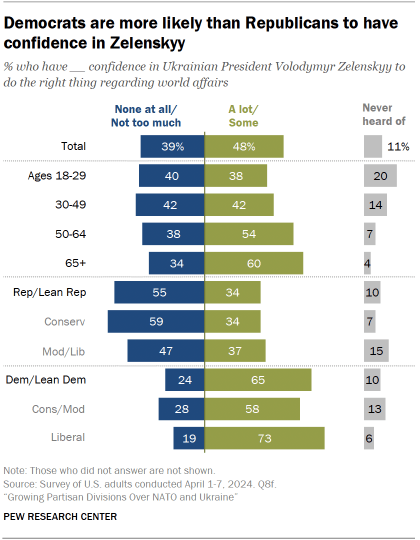Note: For more recent survey data on the U.S. role in Ukraine, read our July 2024 report “War in Ukraine: Wide Partisan Differences on U.S. Responsibility and Support.”
Here are key takeaways regarding attitudes on U.S. involvement with the war in Ukraine:
- Just over two years after Russia’s invasion of Ukraine, Americans are divided on their views of U.S. aid for Ukraine and the effect that support to Ukraine might have on U.S. national security.
- Concerns about Ukraine being defeated and taken over by Russia and about Russia invading other countries in the region are somewhat higher than in the fall of 2022. However, levels of concern are still lower than they were at the start of the war.
- Americans are more confident in Ukrainian President Volodymyr Zelenskyy than not, but confidence in Zelenskyy has decreased significantly over the past year.
Views of U.S. support to Ukraine
About a third of Americans (31%) say the U.S. is providing too much support to Ukraine. Roughly equal shares of U.S. adults say the U.S. is providing about the right amount (25%) or not enough support (24%) to Ukraine, while 18% say they are not sure.

In March 2022, shortly after the invasion, about four-in-ten Americans said the U.S. was not providing enough support to Ukraine (42%). This share has since decreased by nearly 20 percentage points. Meanwhile, the share of those saying that the U.S. is providing too much support to Ukraine has grown from 7% in March 2022 to 31% in April 2024.
Partisanship
Roughly half of Republicans and Republican-leaning independents say the U.S. is providing too much support to Ukraine, compared with 16% of Democrats and Democratic leaners.
In March 2022, almost half of Republicans said the U.S. was not providing enough support to Ukraine, 11 points more than the share of Democrats who said this. Today, that same share of Republicans (49%) say that the U.S. is providing too much assistance to Ukraine.
After some decline over the last two years, the share of Democrats saying the U.S. is not providing enough support to Ukraine has returned to roughly the same proportion as at the start of the war. Now, 36% of Democrats believe the U.S. is not providing enough support, up from 24% in November 2023 – when we most recently asked this question – but comparable to the 38% who said this in March 2022.
Partisan views vary by ideology, with conservative Republicans (54%) more likely than moderate and liberal Republicans (40%) to say the U.S. is providing too much assistance to Ukraine. Conservative and moderate Democrats are more likely than liberal Democrats to say the U.S. is providing too much support to Ukraine (54% vs. 11%).
Partisans also differ by age, with younger Republicans and Democrats more likely than their older counterparts to say the U.S. is giving too much aid to Ukraine. Younger partisans are also significantly more likely to answer “Not sure” on this question.
Concerns about Russia taking over Ukraine, invading other countries

Two years into Russia’s war with Ukraine – and two months after Zelenskyy announced plans to reshuffle Ukraine’s military and political leadership – 44% of Americans say they are extremely or very concerned about a Russian victory and takeover in Ukraine. This share has increased by 6 percentage points since we last asked in September 2022, but it’s still below the 55% who said this in April 2022.
There are wide partisan gaps on this topic. A majority of Democrats (55%) are extremely or very concerned about the possibility of Ukraine being defeated and taken over by Russia, up 10 points since September 2022. About a third of Republicans (35%) hold this view, little changed from 32% in fall 2022.
Among Democrats, liberals are more likely than conservatives and moderates to express concern about a Ukrainian defeat. There is no ideological difference among Republicans.
Older Americans are much more worried about this outcome than younger adults. Six-in-ten adults ages 65 and older report they are extremely or very concerned, compared with 35% of adults under 30.
Concerns that Russia poses a threat to other countries in the region have also increased: 48% of Americans now say they are extremely or very concerned about Russia invading another country, up from 41% in September 2022. But this is also down from the 59% who said this in April 2022, a few months into the war.
Around six-in-ten Democrats (58%) are extremely or very concerned about a Russian invasion elsewhere in the region, an 11-point increase from September 2022. Roughly four-in-ten Republicans (41%) are extremely or very concerned, up from 35% in September 2022. Concerns are especially high among liberal Democrats and are less common among conservative Republicans.
Older Americans are 20 points more likely than younger Americans to say they are extremely or very worried about Russia invading other countries (61% vs. 41%).
Impact of supporting Ukraine on U.S. national security

Americans are divided on the potential security effects of supporting Ukraine in its war against Russia. Equal shares say that supporting Ukraine helps and hurts U.S. national security (36% each). About a quarter (24%) believe support for Ukraine has no impact on U.S. national security.
Democrats (49%) are more likely than Republicans (24%) to say that supporting Ukraine helps national security. Democrats ages 50 and older are especially likely to view U.S. support of Ukraine as a benefit to national security, with 59% saying this. In comparison, only 41% of Democrats ages 18 to 49 agree. Liberal Democrats (57%) are also particularly likely to consider U.S. assistance to Ukraine as a positive for national security.
Among Republicans, those ages 18 to 49 are more likely to say that supporting Ukraine hurts U.S. national security (54%) than those 50 and older (40%).
Confidence in Zelenskyy

About half of Americans (48%) say they have some or a lot of confidence in Ukrainian President Volodymyr Zelenskyy to do the right thing regarding world affairs – a decrease of 8 points since 2023. Roughly four-in-ten (39%) have little or no trust in him to do the right thing.
Adults ages 65 and older are more likely to evaluate Zelenskyy positively than any other age group. For example, they are about 20 points more likely than adults under 30 to have confidence in Zelenskyy (60% vs. 38%). Meanwhile, two-in-ten Americans ages 18 to 29 say they have never heard of the Ukrainian leader.
Democrats are about twice as likely as Republicans to have at least some confidence in Zelenskyy.
When looking at partisans by ideology, liberal Democrats are especially likely to express confidence in Zelenskyy. Even conservative and moderate Democrats are much more likely to hold this view than either moderate and liberal Republicans or conservative Republicans. In contrast, about six-in-ten conservative Republicans lack confidence in the Ukrainian leader.




